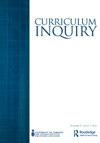教育和生态不稳定:教学、课程和概念上的挑衅
IF 1.6
3区 教育学
Q2 EDUCATION & EDUCATIONAL RESEARCH
引用次数: 14
摘要
气候危机太大了,无法想象,也太紧迫了,无法忽视,它是我们为本期特刊撰写编辑引言时许多新闻标题的文本或潜台词。我们在新冠肺炎大流行期间写作,就在格拉斯哥举行的COP26气候峰会之后,就在经历了一个致命的热浪夏季之后,在不列颠哥伦比亚省的一条高速公路因洪水倒塌之后,以及就在加拿大皇家骑警再次入侵Wet‘suwet’en之后,在那里,土地捍卫者正在持续保护他们的土地和水域免受天然气管道建设的影响。无论你什么时候读到这篇文章,还是从哪里读到,你都会在气候危机造成的破坏期间和“刚刚”之后阅读。我们可以指望危机会持续不断地出现、侵蚀和恶化。我们正处于一个有保证的不稳定时期。青年气候活动家继续激励;他们要求企业和政府对缺乏实质性行动负责,并提请人们注意采取行动的必要性。在COP26峰会令人失望的情况下(包括来自世界各地的年轻人1),以某种方式扩大和升级应对气候危机的措施仍然更加紧迫。我们每天都被提醒这种紧迫性。最近的一个标题宣布:“极端天气事件是‘新常态’”(麦格拉斯,2021)。文章接着列举了今年世界各地的一些极端事件,包括干旱、极端降雨和海平面加速上升。我们正沉浸在生态破坏、其不成比例的分布影响以及殖民政府坚持资本主义榨取主义的故事中。这些故事所说明的毁灭性时代要求在多个层面作出紧急反应。我们召集了这期特刊,呼吁考虑采取课程和教学对策的可能性。特别是,我们看到,由于气候变化,人类和人类生活的变化速度之快与K-12学前教育和高等教育的课程和教学法缺乏相应的、负责任的变化之间存在脱节。在这篇引言中,我们详细阐述了激发特刊灵感的关键主题,以及文章作者如何在各种课程项目和教学干预中处理这些主题。这些主题包括以自然文化关系为中心,见证关系故事,颠覆殖民主义,关注黑人生态,以及参与跨学科教学。我们对黑人和土著气候变化学者进行了批判性采访,其中包括Megan Bang、Ananda Marin、Max Liboiron、Katherine Crocker、Deandre Smiles、J.T.Roane和本文章由计算机程序翻译,如有差异,请以英文原文为准。
Education and ecological precarity: Pedagogical, curricular, and conceptual provocations
Too big to imagine and too urgent to ignore, climate crisis is the text or the subtext of many of the news headlines as we write the editorial introduction to this special issue. We write while still in the COVID-19 pandemic, just after the COP26 climate summit in Glasgow, just after a summer of deadly heatwaves, just after a highway collapsed due to flooding in British Columbia, and just after the Royal Canadian Mounted Police again invaded Wet’suwet’en, where land defenders are engaged in the ongoing protection of their lands and waters from construction of a gas pipeline. No matter when you read this or where you are reading from, you will also be reading during and “just after” the devastation caused by climate crisis. We can count on the permanence of crises popping up, eroding away, and worsening. We are in times of guaranteed precarity. Youth climate activists continue to inspire; they hold corporations and governments to account for the lack of substantive action and bring attention to the need for action. Amidst the disappointments of the COP26 summit (including those identified by youth from all corners of the world1) somehow scaling up and escalating a response to climate crisis remains ever more urgent. We are reminded of this urgency every day. A recent headline announced: “Extreme weather events are ‘the new norm’” (McGrath, 2021). The article proceeded to name some of the extreme events of the year from around the world including drought, extreme rainfall, and an accelerated rise in sea levels. We are drowning in stories of ecological devastation, its disproportionately distributed effects, and colonial governments’ insistence on capitalist extractivism. The ruinous times illustrated by these stories demand urgent responses at multiple levels. We have convened this special issue as a call to consider possibilities for curricular and pedagogical responses. In particular, we see a disconnect between how quickly human and more-than-human lives are changing as a result of climate change and the lack of accompanying responsive and responsible changes in curriculum and pedagogy in preK–12 schooling and in higher education. In this introduction, we elaborate on key themes that inspired the special issue and how article authors have taken up these themes in various curricular projects and pedagogical interventions. These themes include centering nature-culture relations and witnessing relational stories, disrupting colonialism, attending to Black ecologies, and engaging with interdisciplinary pedagogies. We bring the articles into conversation with critical interviews we conducted with Black and Indigenous climate change scholars, including Megan Bang, Ananda Marin, Max Liboiron, Katherine Crocker, Deondre Smiles, J.T. Roane, and
求助全文
通过发布文献求助,成功后即可免费获取论文全文。
去求助
来源期刊

Curriculum Inquiry
EDUCATION & EDUCATIONAL RESEARCH-
CiteScore
3.10
自引率
17.60%
发文量
37
期刊介绍:
Curriculum Inquiry is dedicated to the study of educational research, development, evaluation, and theory. This leading international journal brings together influential academics and researchers from a variety of disciplines around the world to provide expert commentary and lively debate. Articles explore important ideas, issues, trends, and problems in education, and each issue also includes provocative and critically analytical editorials covering topics such as curriculum development, educational policy, and teacher education.
 求助内容:
求助内容: 应助结果提醒方式:
应助结果提醒方式:


